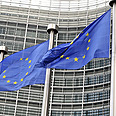
EU flag
Photo: AFP
Heads of states in the European Union, it is safe to assume, will not be particularly impressed or frightened by the fiery statements following the decision not to include Israeli communities located beyond the 1967 lines in any future contract with the Union's 28 member states.
No one in Israel's political establishment should be surprised. The Europeans have not concealed their position against settlement construction in the territories, the stalemate in the peace process with the Palestinians during Netanyahu's previous term as prime minister and what they perceive as the loss of any chance to resume negotiations toward an agreement.
The Holocaust
Riccardo Dugulin
Op-ed: Day of remembrance highly disconnected from what European societies really feel about Holocaust
A senior European ambassador checked over the past few months to see how many Knesset members actually support the "two states" idea – Israel alongside Palestine – as a reasonable solution to the conflict between the two nations. "I found that no more than two lawmakers in the current Knesset support the idea of two states," he said. Two MKs. No more.
An EU representative who recently visited Israel asked me why the Israelis are not showing any interest in what is happening to millions of Palestinians in the West Bank and Gaza. We prefer to live in denial, I replied.
It's a shame that Netanyahu preferred to respond with belligerent rhetoric that has nothing to back it up. Let's see how he reacts if the Europeans persist with the implementation of the new guidelines, which may cut the research budgets by hundreds of millions of euros given as aid to the Israeli industry. So what does Netanyahu propose to us? Blood, sweat and tears; a return to the austerity period of Israel's early statehood.
The writing was on the wall. Foreign Ministry officials warned the government of a deterioration in the relations with the Europeans. Chancellor Merkel tried to convince Netanyahu to show initiative, because if he doesn’t no one will be able to stop the tsunami that is the European attitude toward Israel. In Germany, Israel's most important friend in Europe, a generation of politicians emerged that refuses to continue to apologize and accept Israel as it is only because of the guilt related to the Holocaust. A new generation is emerging of Europeans who expect us to take the initiative, propose real solutions to the conflict and stop talking about anti-Semitism and about how they supposedly do not have the right to preach morality to us.
In other words, when Obama declared that an agreement with the Palestinians will be based on the 1967 borders, he meant it. If anyone has a different proposal, he should stand up now and present it to the world.
Israel is perceived as the strong side in the conflict with the Palestinians, so the demands from it are comprehensive.
To summarize, the predicament that has been exposed vis-à-vis the Europeans obligates Netanyahu to reach decisions of historic proportions rather than make another statement you would expect from a division manger in an Israeli government office, not from the leader of a country.
Anyone who expects the world to assist him in the effort to prevent Iran from producing nuclear weapons must heed the world's demand to operate differently in the territories. "Yitzhar in exchange for Natanz and Fordo," two nuclear plants in Iran, is not just a slogan; it is an equation that obligates the Israeli side as well.















